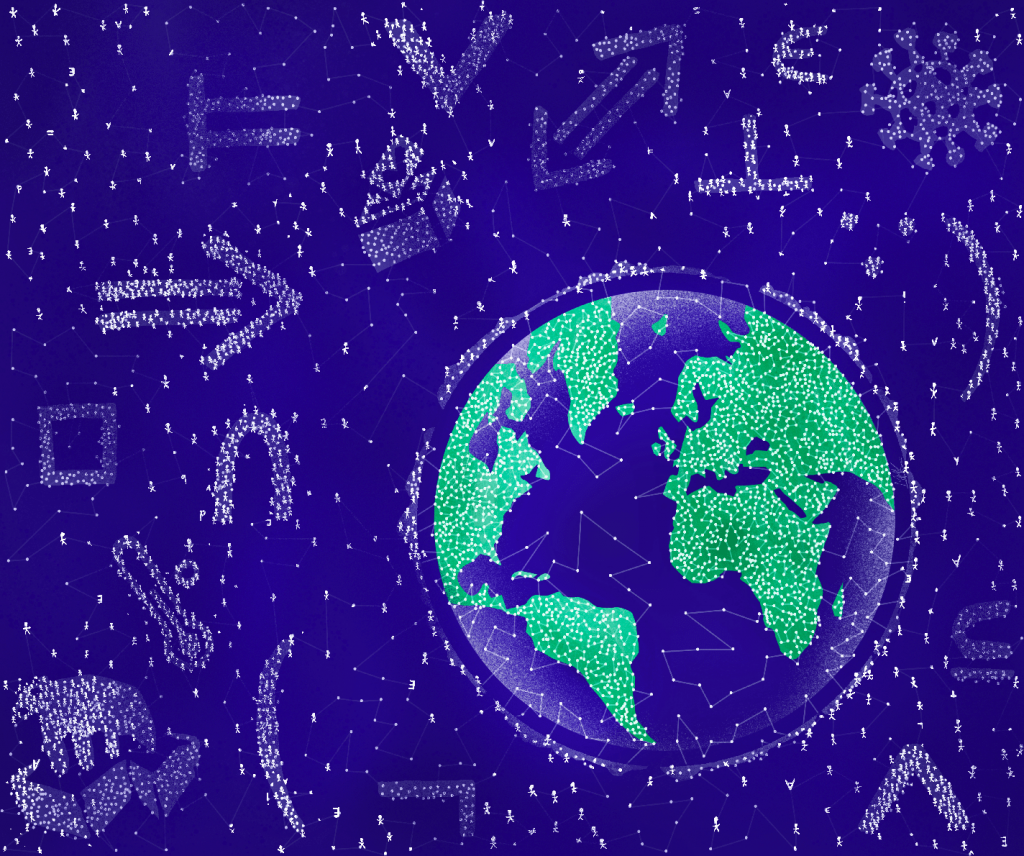14 January 2021, Iris Proff

Whoever followed the news during the last months might come to the conclusion that rationality is on the decline. People deny climate change against scientific consensus and refuse to vaccinate against a virus that is paralyzing society. Others storm the US capitol, desperately rebelling against a “stolen vote” without any evidence for irregularities in the voting process. And almost everywhere, people stock up on toilet paper without an obvious reason. Where does this madness come from?
Researchers at the ILLC use logical models to understand how common beliefs emerge in groups of people. Sonja Smets and Alexandru Baltag reveal that what looks like a failure of reasoning at first sight might actually have much more interesting explanations.

“I am optimistic about people. Before we shout that people are irrational, we should first try to understand what their beliefs are based on.”
Johan van Benthem
Cascading information
Beliefs can create realities. If I believe that everyone else will buy a lot of toilet paper, because I think they believe there is a toilet paper shortage, then it makes sense for me to buy a lot of toilet paper. Eventually, this behaviour will create a real toilet paper shortage. In such informational cascades, every individual ignores their private knowledge that and instead follows the actions or beliefs of others.
Similar mechanisms underlie many social, political and economic phenomena, often with far-reaching consequences. If a politician convinces millions of people that the elections have been stolen, then this very belief can be used as an argument to question the election outcome: “If so many people believe in it, it can’t be wrong.” This can make the imaginary danger come true, by putting the elections at risk of being ‘stolen’ by their supposed defenders.
“Our logical models show that informational cascades sometimes happen even if every agent is fully rational”, says epistemic logician Alexandru Baltag. Every individual acts to maximize their personal outcome – nobody wants to live in an undemocratic society or be left without toilet paper – and yet, the group as a whole behaves irrationally.
Informational cascades only happen when certain pieces of information about what other people do or think are public, while their reasons to do so are not. This is why the internet and social media in particular make this phenomenon much more likely. In a world of sound bites, tweets and fast clicks, we instantly share our opinions and behaviors, but the underlying reasons and arguments are often left out.

Polarized groups
Next to triggering informational cascades, one of the dangers of online social networks is their capacity to create polarized groups: people in favour of and against vaccinations, climate activists and climate deniers, republicans and democrats.
Everyone has small biases – and the internet amplifies them. By feeding users only content in line with what they think, social media transforms biases into fixed beliefs. Soon people with opposing beliefs do not share any common reality anymore. They read different news items, hear different opinions and get opposing information about which sources are trustworthy. Common ground is lost. The beliefs and actions of people from the other group become less and less understandable. The easiest explanation is that the other side is either crazy or manipulated by some evil force.
But, as logicians at the ILLC point out, the behaviour and beliefs of each individual might look perfectly rational to that person in isolation. “The problem is not people’s stupidity, but the structure of the social network”, says Alexandru Baltag. Given the partial information individuals have, they might make logically valid decisions. But they appear completely irrational to people holding opposing beliefs based on different evidence. If you firmly believe that climate change poses an existential threat, it makes sense to demand from governments to take rapid action. If you are convinced that an election has been stolen, it might seem rational to you to question it.
However, a strong conviction alone does not justify action. We mostly do not know all the facts relevant to our decisions and part of forming a belief about the world is almost always deciding who to trust. A crucial component of rationality is thus to critically examine the evidence that one’s beliefs are based on, track its sources and consider their possible biases. Such objective fact-checking is made difficult by the flood of information inside social networks and the echo-chambers they create.
Irrational group behaviour might not always be due to flawed reasoning, after all. Surely, individuals do make reasoning mistakes and at times their actions are in conflict with what they know. But the main problem is that many people do not know anymore how to identify the truth under layers of digital lies and manufactured reality. If you start with wrong premises, flawless reasoning will not prevent you from arriving at wrong conclusions.

When independence of opinion gets lost
When aggregating many independent opinions, one arrives at the right decision. This is a crucial idea from social choice theory, and it truly lies at the heart of democracy. However, independence of opinion is almost impossible in the digital age. Opinions are immediately available to everyone and information comes in at a pace that does not make it easy to verify its accuracy.
“The internet has often been called a global village.” says Alexandru Baltag. “Everyone talks to everyone else and there are no certified sources of information. A global village is the breeding ground for global rumours.” Logical models show that when social networks are less densely connected, consensus takes longer, but it is much more likely that collective decisions are in line with the facts.
“This research is of foremost importance”, says Sonja Smets, director of the ILLC. “Not knowing about the factors that influence your beliefs makes you an easy victim for manipulation.” And by definition, whenever you are being manipulated, you will be convinced that you are not.
Curious for more on the topic? Find a presentation by Alexandru Baltag about the fate of truth in the age of information here.